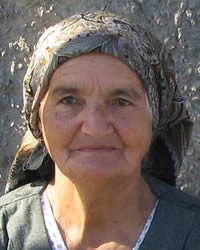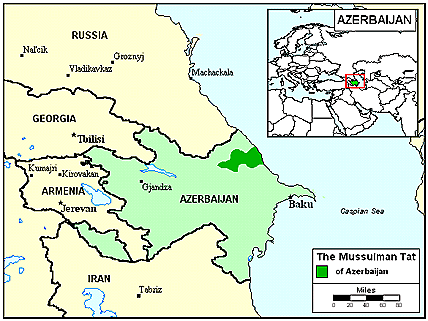The Turks originally coined the term "tats" to designate settled groups of non-Turkic origin. The Muslim Tat speak a local language known as Tati, which is not a Turkic language. Because no alphabet exists for Tati, they use Azeri (Azerbaijani) for their written and literary language. Depending on the area in which they live, the Tat speak other regional languages in addition to their own. They are part of three distinct religious communities that fall into a category known as tats. The three groups include the Jewish Tat (known as mountain Jews), the Christian Tat, and the Muslim Tat. The Muslim Tat of Azerbaijan live in the mountain valleys of the north and northeastern parts of the country. Most live in northwestern Iran, in the mountain valleys along the Azerbaijani border. A large number also live in the capital city of Baku.
Azerbaijan is an ethnically complex country where minority groups staunchly defend their traditional differences and struggle for local autonomy. The Tats are considered a closed society because they insist on maintaining ethnic purity by allowing marriage only within the tribe. Although the Azerbaijani Mussulman Tat have been an agricultural people from the beginning of their history, they have also developed a strong urban community. Farmers living in the valleys raise wheat, barley, maize, and cattle. Those living in mountain villages raise sheep, bulls, and buffaloes. In the northeastern area, communities consisting of 80 to 120 households are located in mountain settlements built on ledges. The rural Muslim Tats still live in their ancestral villages among the mountains and valleys. The availability of well water determines the village location. Each villages contains a mosque, a bath area, and a well along with family dwellings. Muslim Tats in rural areas usually live in one- or two-story homes, which are constructed of rectangular-shaped natural stones cemented with clay mortar. The houses feature flat roofs and front porches supported by wooden pillars. Families living in two-story homes use the upper floor for living quarters and the lower floor for workspace. Although education is compulsory for children between the ages of six and eleven, many classroom facilities are inadequate. Classes are segregated by sex, and the major emphasis is on religion and traditional values.
Almost all of the Azerbaijani Tats are Muslim. The great majority are Shia Muslim and about one-tenth are Sunni Muslim. Muslim Tats adhere to the five essential "pillars" or duties in Islam: (1) A Muslim must affirm that "there is no god but Allah and Mohammed is his prophet." (2) Five times a day he must pray while facing Mecca. (3) He must give an obligatory percentage (very similar to tithes) on an annual basis. (4) He must fast during Ramadan, the ninth month of the Muslim year. (5) He must try to make at least one pilgrimage to Mecca in his lifetime. Most Shia Muslims believe in the traditional form of marriage for life. However, some traditional Shia still practice mutah, a form of temporary marriage that can be dissolved at any time stipulated in the premarital agreement.
There has been little evangelization among Muslim Tats because they are such a small group and because they live in hard to access places.
Pray for Holy Spirit anointed workers to go to the Muslim Tats in Azerbaijan, and work among them until there is a movement to Christ. Pray for a spiritual hunger that will lead the Muslim Tats to the foot of the cross, so they can accept Christ's blood as the only atonement for sin. May they come to know that true peace and community transformation is found in embracing Jesus. Pray for the Lord to provide an abundant grain harvest among the Muslim Tat as a testimony of his goodness and power.
Scripture Prayers for the Tat, Muslim in Azerbaijan.
| Profile Source: Joshua Project |
| Other PDF Profile |












